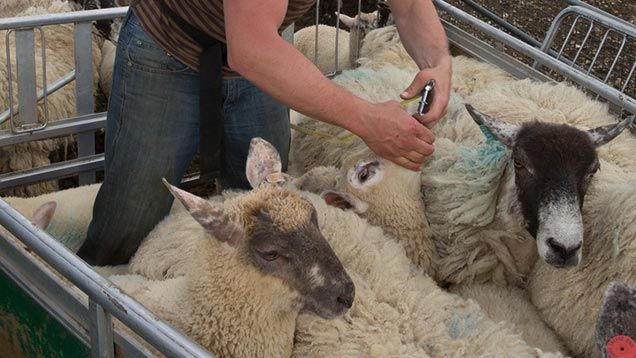Resistance to wormers in sheep has increased in Wales, study shows
 © Tim Scrivener
© Tim Scrivener Anthelmintic resistance to wormers in sheep has seen an increase in Wales, initial results from a Hybu Cig Cymru study shows.
Since the previous study in 2006, even products that were considered effective at the time have become resistant.
More worryingly, five farms showed resistance to all four wormers tested.
Surveillance is being carried out on 45 farms by Techion UK as part of the Wales Against Anthelmintic Resistance Development (Waard) project, which is being funded by the Rural Development Plan for Wales.
Faecal egg counts (FECs) were carried out on 24 farms before and after treatment on four wormer groups and the percentage reduction of worms was calculated.
To be fully effective the count must drop by at least 95%.
Three older wormer groups (1-BZ, 2-LV and 3-ML) were efficacy tested as well Moxidectin (a member of the 3-ML group with persistent action).
Initial findings show:
|
Drug group |
1-BZ (white drench) |
2-LV (yellow drench) |
3-ML (clear drench)
|
|
|
IVM |
Moxidectin |
|||
|
% with resistance detected |
83% |
67% |
29% |
21% |
Further findings show:
- Only rare Moxidectin instances of resistance had previously been recorded, with Moxidectin remaining effective even where other 3-ML products such as Ivermectin are failing. But this study shows 21% of farms tested now show signs of resistance (see table).
- This represents an increase in resistance to white drench compared with previous survey in 2006, when 80% of the farms surveyed showed evidence of resistance.
- Four farms had evidence of resistance to all four wormers.
Experts say while the results are not surprising they are deeply concerning.
Lesley Stubbings, sheep consultant representing Sustainable Control of Parasites in Sheep (Scops), said: “We shouldn’t be surprised by these results, because we know that the incidence of anthelmintic resistance has continued to increase in recent years.”
But she added: “The detection of Moxidectin resistance on one in five of the farms, however, is a real concern and a very timely reminder that we must act fast if we are to maintain good worm control on sheep farms.
“The overriding message coming out of the Waard project is it is vital that sheep farmers know which drugs work effectively on their farm because so many are continuing to use products with reducing efficacy.
“As a result they are losing lamb performance as well as heading down the slippery slope to a fully resistant worm population, from where there is no return.”
Ms Stubbings said a simple drench test after treatment will give an indication of the resistance status and should be a routine on all sheep farms.
The project runs until June 2015 and the remaining farms will be tested in the spring and early summer.
Further analysis is being carried out to see what species of roundworms have survived treatment to complete the picture of what is happening on each farm.
